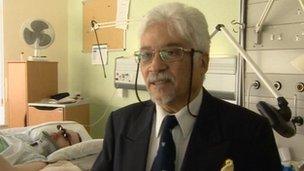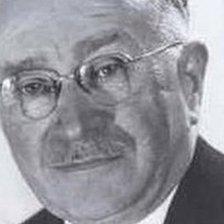Surgeon proud to see patients compete in Paralympics
- Published

Prof el Masri said Sir Ludwig's influence had carried on through his work
"Just by participating, by reaching that level - not just for me, but all the nurses and the team involved - we're very proud."
Prof Wagih el Masri, a consultant surgeon in spinal injuries at the Robert Jones and Agnes Hunt Orthopaedic Hospital in Shropshire, has played a big part in getting three athletes to next week's Paralympics.
Spinal cord patients Ryan Cockbill and Richard Davies, both from Birmingham, are to compete in shooting and Josie Pearson, of Hay-on-Wye in Powys, is taking part in the discuss and hammer.
Cockbill and Davies will be making their Paralympic debut while Pearson became the first woman to represent ParalympicsGB when she made her Games debut in Beijing in 2008.
The hospital near Gobowen encourages patients to get into sport competitively but "does not impose on them", the surgeon said.
"They are encouraged to assert themselves as part of treatment and it grows from there.
"Some use our great swimming pool facilities here in Shropshire or they go to other hospitals or centres - there's an emotional benefit from doing sport.
"Having a spinal injury really means they are patients for life."
The work Prof el Masri does is part of the legacy of his tutor and founding father of the Paralympics, neurologist Sir Ludwig Guttmann.
His decision to use sport as part of rehabilitation for patients with spinal cord injuries changed forever their outcome.
Prof el Masri was the the last doctor to be taught by Sir Ludwig before his death in 1980.
They worked together at Stoke Mandeville hospital in Buckinghamshire, where Sir Ludwig started the Games in 1948.
"He really was a wonderful man," Prof el Masri said.
"His influence has carried on through my work and we're very proud to have people in the Paralympics."
Sir Ludwig first went to Oxford as a refugee escaping Nazi Germany and from there was asked to run the spinal injuries unit at Stoke Mandeville for injured soldiers returning from World War II.
While he was there, he organised a competition for more than a dozen paralysed men and women - the Stoke Mandeville Games for wheelchair athletes - to coincide with the opening ceremony of London's 1948 Olympic Games.
Four years later, competitors from the Netherlands competed, which saw the beginnings of the international event.
By 1960, the modern Parallel Olympics - or Paralympics - were established when a Games for athletes with a disability was held at the Rome Olympics.
Prof el Masri said it was "obvious" Sir Ludwig was an important figure at the hospital.
"I was a young senior house officer at Stoke Mandeville when this gentleman in his late 60 or 70s came by with an entourage of people who walked one or two steps behind him," he said.
"You didn't believe what one heard, in making people paralysed from the neck downwards stand up, with support, enabling people with paralysis from the neck or chest down to go back to work.
"He transformed the outcome of spinal cord injury from a certain death."

It was "obvious" Sir Ludwig was an important figure, Prof el Masri said
Sir Ludwig spent a lot of his personal time studying the causes of complications and causes of deaths that afflicted patients.
He would also sleep in the wards and get up several times during the night to turn patients to ease pressure sores which were synonymous with spinal cord injuries.
"He demonstrated that all complications following spinal cord injuries are preventable," Prof el Masri added.
"Once he established that, he started concentrating on finding ways to motivate, encourage, challenge and help individuals to actually get out of their sorry state and re-engage in life, with all its facets.
"Overall, I think he [Sir Ludwig] is a hero of many people.
"He is definitely a role model to me and many people.
"I'm going to try to get to the Games as I'm in London at the time.
"We're very proud of all our patients not just those competing in competitive sport but those in competitive employment too."
- Published23 August 2012
- Published26 June 2012
- Published15 September 2011